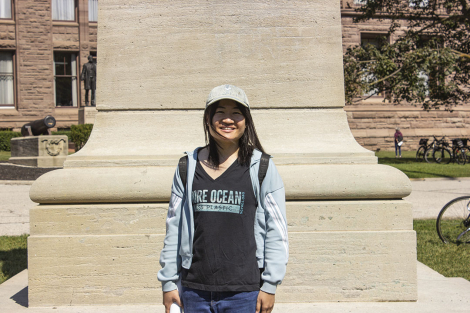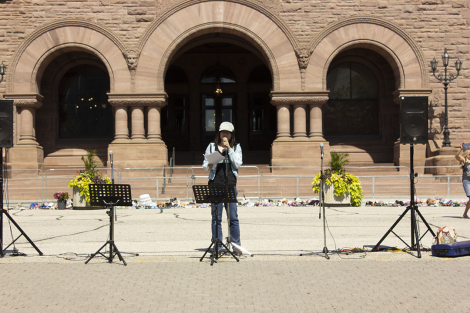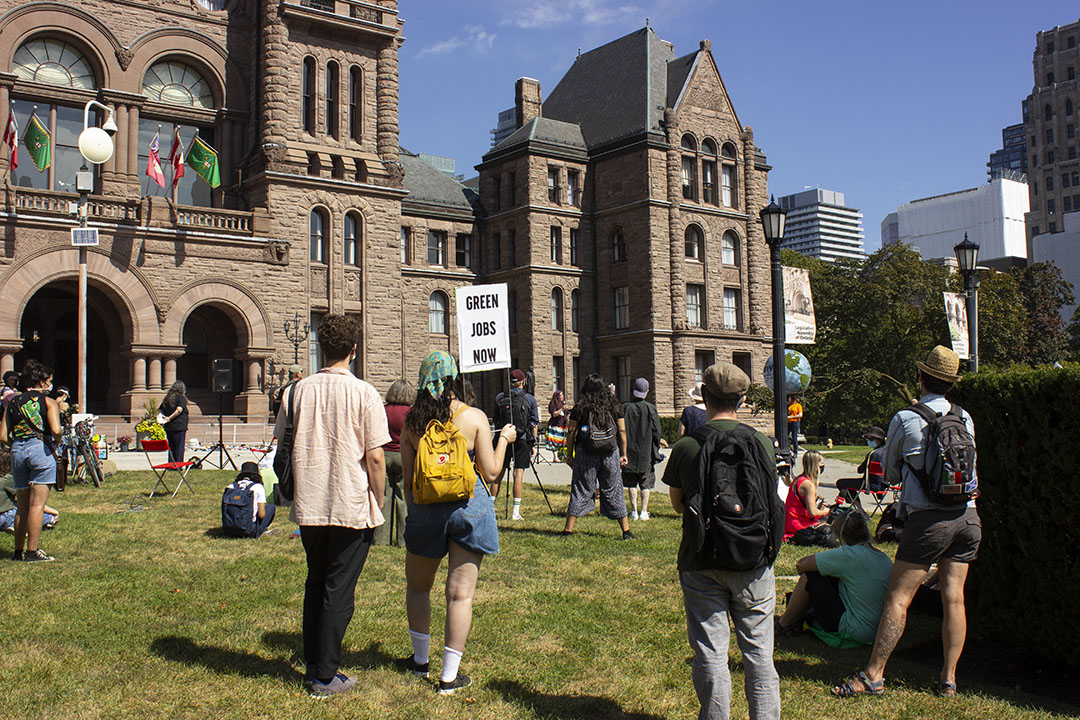On September 8, U of T students joined members of the public in a rally at Queen’s Park to demand further action on climate change ahead of the snap federal election on September 20.
The event was organized by Toronto350.org, the local division of the international environmental activism organization 350.org, and the People’s Climate Movement, an international coalition of organizations that advocate for climate justice. The rally was one of several organized across the country on the same day by 350.org.
The rally also came ahead of an election where the climate crisis is a key concern for many voters and the consequences of the climate crisis are clearly visible. British Columbia is currently experiencing its worst wildfire season since 2018.
In August, a landmark report from the Intergovernmental Panel on Climate Change (IPCC) — the organization considered to be the world’s premier source for climate crisis modelling — also stated that global temperatures have already risen 1.1 degrees Celsius above pre-industrial levels. An increase of 1.5 degrees Celsius is considered by organizations like the IPCC to be the highest increase we can afford if we want to limit the consequences of a warming climate.

Alice Zhu, a PhD student at UTSC, was one of the event organizers. TAHMEED SHAFIQ/THE VARSITY
“An issue that affects everyone”
Alice Zhu, a PhD student in the Department of Physical and Environmental Sciences, was one of the co-organizers of the event. In addition to being a climate activist, Zhu’s research focuses on the environmental impacts of pollution.
“Climate change is an issue that affects everyone, and it matters to our survival,” she said in an address to the crowd. “It does not matter if we build back the economy only to end up losing our planet.”
“The latest IPCC report made it clear that we need to treat the climate crisis as a real emergency,” she added. “This year, Canada was ravaged by wildfires from coast to coast, and it will only get worse. There is no time to waste. We must put climate at the forefront of this election.”
Protesting for climate action means “everything” to Zhu, she said in an interview with The Varsity. “My livelihood, my future, my friends, and family… it all depends on what we do to tackle climate change.”
That action does involve changing one’s own behaviour, Zhu said, but effective climate action is bigger than any one individual. “Government, the politicians… the big investors that back up the major polluters like banks — we should be shifting the burden of responsibility [onto] them, because a lot of us are doing what we can in our socioeconomic realities. Now it’s up to the banks and the politicians to do their part.”

A speaker at the climate action protest. TAHMEED SHAFIQ/THE VARSITY
Organizing for the first time
Rivka Goetz is a fourth-year undergraduate majoring in critical studies in equity and solidarity at UTSG and a member of the campus environmental action group Leap UofT. She said that attending protests still matters to her, even though, as an international student, she cannot vote.
She compared herself to other young people who attended the rally but were not old enough to vote, and so relied on others to make decisions that affected them.
“If I were voting, climate would be a very important issue,” she said in an interview with The Varsity. “But because I can’t, I want to make my voice heard at rallies like this and through the work I do at Leap.”
Serena Buiani, a student in a teaching Master’s program at the Ontario Institute for Studies in Education, was another organizer of the event. But, unlike Zhu, this was her first time organizing a protest.
After the August IPCC report, she realized that individual action was “simply not enough” to spur climate action. “I realized I had to join a movement,” she said. “I had to start actively demanding more from the government.”
She intends to stay involved in activism after the success of her first event.
Buiani encouraged other U of T students who may be considering getting into activism to learn from her example. “I stepped out of my comfort zone because we have no time at this point. And the more of us there are, the stronger we are. So, really, just don’t be afraid to take that first step.”
A larger protest for climate action is currently planned to take place on September 24, two years after the international climate protests that were led by Greta Thunberg in 2019.


